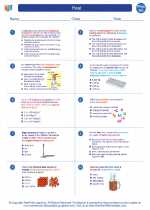Rock Cycle: Explanation and Study Guide
Introduction to the Rock Cycle
The rock cycle is a continuous process through which rocks are transformed from one type to another over geological time scales. It involves a series of processes such as weathering, erosion, deposition, compaction, and cementation that act upon the Earth's crust to form and alter different types of rocks.
Types of Rocks
There are three main types of rocks involved in the rock cycle:
- Igneous Rocks: Formed from the cooling and solidification of molten rock (magma or lava).
- Sedimentary Rocks: Formed from the accumulation and cementation of sediments, such as sand, silt, and clay.
- Metamorphic Rocks: Formed from the alteration of existing rocks due to high heat, pressure, or chemical processes.
Processes in the Rock Cycle
The rock cycle involves several key processes:
- Weathering: Breakdown of rocks into smaller particles due to exposure to the atmosphere, water, and biological activity.
- Erosion: Transport of weathered rock and soil by water, wind, or ice.
- Deposition: Accumulation of eroded sediments in a new location, such as river beds or ocean floors.
- Compaction: Compression of sediments due to the weight of overlying layers, leading to the expulsion of water and air from the pores.
- Cementation: Binding of sediments together by minerals precipitating from water, forming sedimentary rocks.
- Melting: Conversion of rocks into magma due to high temperatures and pressure in the Earth's interior.
- Crystallization: Solidification of magma to form igneous rocks.
- Heat and Pressure: Transformation of existing rocks into metamorphic rocks due to tectonic forces or deep burial.
Study Guide
To study the rock cycle effectively, consider the following key points:
- Understand the characteristics and formation processes of igneous, sedimentary, and metamorphic rocks.
- Learn the sequence of processes involved in the rock cycle, including weathering, erosion, deposition, and the formation of new rocks.
- Identify the geological conditions that lead to the formation of each type of rock, such as high temperatures for igneous rocks and intense pressure for metamorphic rocks.
- Study the geological features associated with each type of rock, such as volcanic landscapes for igneous rocks and sedimentary layers for sedimentary rocks.
- Explore real-world examples of rocks and geological formations to understand the practical applications of the rock cycle.
By mastering these concepts, you will gain a comprehensive understanding of the rock cycle and its significance in shaping the Earth's surface over millions of years.
.◂Physics Worksheets and Study Guides High School. Heat
The resources above cover the following skills:
PHYSICAL SCIENCE (NGSS)
Energy
Students who demonstrate understanding can:
Create a computational model to calculate the change in the energy of one component in a system when the change in energy of the other component(s) and energy flows in and out of the system are known.
Develop and use models to illustrate that energy at the macroscopic scale can be accounted for as either motions of particles or energy stored in fields.



